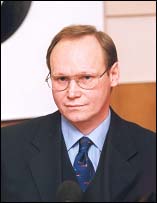 RUSSIA - FINALLY REFORMING BANKING
RUSSIA - FINALLY REFORMING BANKING |
The 1998 crisis in Russia became a starting point
for initiating reforms in a number of areas. It
is promising that in 2002, after more than two years
of legal scrambling, Russia was erased from the
Financial Action Task Force's international blacklist
of non-cooperative countries in the global fighting
against terrorism and money laundering. "The
most essential thing is that the banking sector
in Russia has definitely recovered after the tremendous
crisis experienced in 1998 and this can be well
observed in all segments of the banking sector in
Russia. There is fierce competition now even in
the retail sector where Sberbank is traditionally
the leader and plays the dominant role", says
Andrei
I. Kazmin, Chairman of the Board & CEO of Sberbank.

Andrei I. Kazmin - Chairman of the Board
& CEO of Sberbank
ITAR-TASS reported that the Prime Minister Kasyanov
also confirmed that bank capitalization in Russia
returned to the level recorded before the August
1998 calamity that saw a sliding in investors'
confidence. He continued by noting that, in 2002,
total bank assets increased by 20 percent to 3.8
billion rubles ($199 million), bank loans to individuals
increased by 46 percent compared with 2001 (to
138.5 billion rubles), while bank deposits increased
36 percent (to 921 billion roubles). One of the
First
Deputy Chairmen of Central Bank (Bank of Russia),
Andrew Kozlov, is sure that in banking sector
is changing in the right direction: "banking
assets are growing, the profitability of the banks
is growing, capital is growing, 90% of Russian
banks are profitable and 75% are experiencing
growth, the growth rate of the banks was three
times higher than last years GDP growth".
Definite progress has been made since 1998, most
notably through the stabilization of the payments
system and the first steps towards legal reform.
The Central Bank adheres to a strong balance of
payment, which can be especially good for those
countries that are tightly connected with international
trade and global economic growth. To Oleg Viyuygin,
First Deputy Chairman of the Central Bank, "The
balance of payment is an instrument, which can
save the country in case of an external shock,
and this is why we are in favour of a strong balance
of payment. We therefore have to prevent a fast
appreciation of our currency." The legal
form in the Banking sector started with the Bank
Bankruptcy Law (March 1999) and the Bank Restructuring
Law (July 1999), which established the Agency
for Restructuring and Credit Organizations (ARCO).

Alexander Tourbanov - General Director of
ARCO
"Our agency was created to
overcome the consequences of the 1998 crisis",
stresses Alexander
Tourbanov, General Director of ARCO. Its aim
was to protect the socially most important banks'
credit interests.
|
"We had to work
with a small scope of banks as the recovery of other
banks was left under their shareholders' and management's
responsibility. Initially we were allocated RUB
10 billion, which was very little as it represented
0.12 % of GDP. We received an additional RUB 2.7
billion in 2000 and 2001. I believe we can claim
to be introduced in the Guinness Book of Records
for the smallest amount granted to overcome a major
banking system crisis", notes Tourbanov. Still,
ARCO has been quite successful in reaching its goals,
while establishing good relations with the International
Monetary Fund, the World Bank, the EBRD and the
US Treasury.
However, the banking sector in Russia is lagging
behind the reform processes in other sectors, which
is why the government has given such significance
to the 2002 Finance Ministry's report entitled "A
Strategy for Bank Sector Development." The
report indicated the insufficient transparency of
bank operations and the high level of outstanding
debts (some 49 billion roubles). The report follows
a five-year development strategy. It is expected
that by the end of this period the assets of the
banking sector will reach 40-50 percent of GDP (36
percent at the beginning of 2002); the credits given
to the real sector of economy will account for 18-20
percent of GDP (15 percent) while the bank equity
will equal 5-6 percent of GDP (6.7 percent). Therefore
credits to the real sector will account for 36-45
percent of bank assets (37 percent in 2002). The
mandatory equity for newly established banks is
raised to 5 million euro in the year 2002. From
2007 on this requirement will be spread to all now
functioning banks. It is impossible to predict what
percentage of them will not be able to meet this
requirement and will have to wind up their activities.
When the authors of "the development strategy"
plan to lower the ratio of the banking capital to
GDP from 6.7 to 5-6% in five years, perhaps they
foresee the inevitable closure of small and medium
banks. In the nearest future the demand made by
the Bank of Russia for the minimum equity of credit
organizations may rise to 150 million rubles (around
5 million euro) or more. At present the equity of
most banks does not comply with this demand. Not
long ago the equity of only about two hundred out
of 1.3 thousand credit organizations (that is, about
15%) exceeded 150 million rubles, more than 160
of them being located in Moscow and the Moscow region.
In general, there is a lack of trust in the Russian
banking system from investors, and the current weak
legal and regulatory infrastructure condones illicit
transactions, an opaque flow of information and
generally hampers bankable business. The proportion
of bank assets to GDP is only half of that in countries
with transitional economies and one third of that
in countries with developed economies, the Ministry
of Finance notes. Roland Nash, Head of Research,
Renaissance Capital, indicates a need for personnel
change (e.g. in the Central Bank, some 80.000 employees),
capital requirements, international financials (transparency),
and a removal of capital controls. Encouragingly,
the government has been full of activity preparing
a bill that would forge banks to improve their transparency,
i.e. to disclose information about owners who are
not officially listed among their founders. Moreover,
Russia introduces in 2003 legislation that imposes
qualifications for the members of bank boards and
gives the Central Bank the right to demand the replacement
of some board members. The government's objectives
include a reduction in state interference in the
sector and the design of fair competition in banking
and financial services, notably by streamlining
supervision of the sector. |

